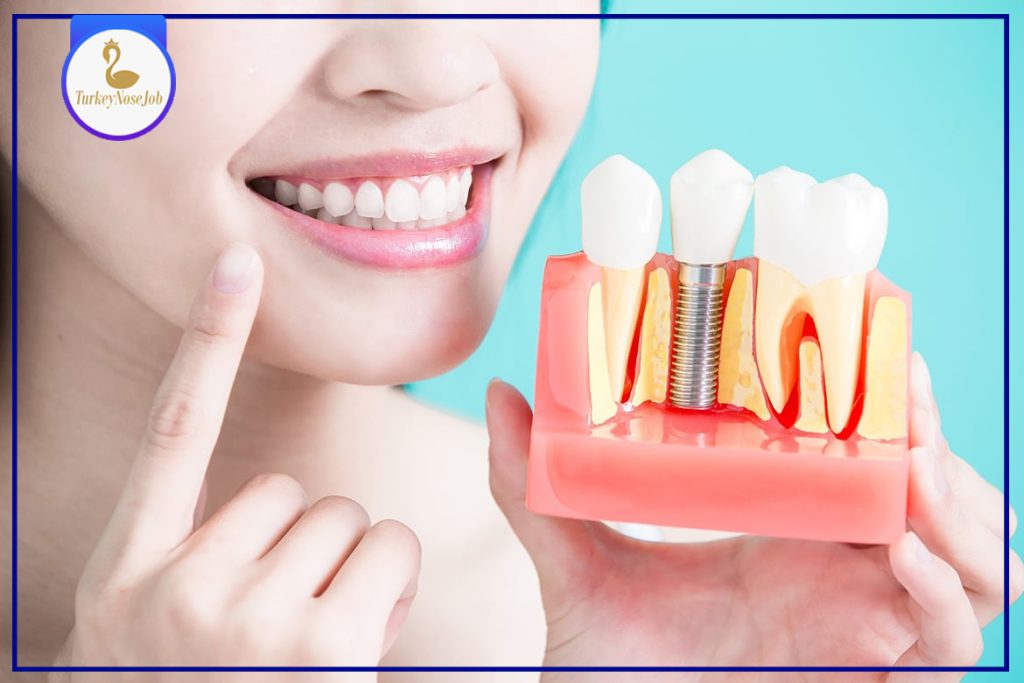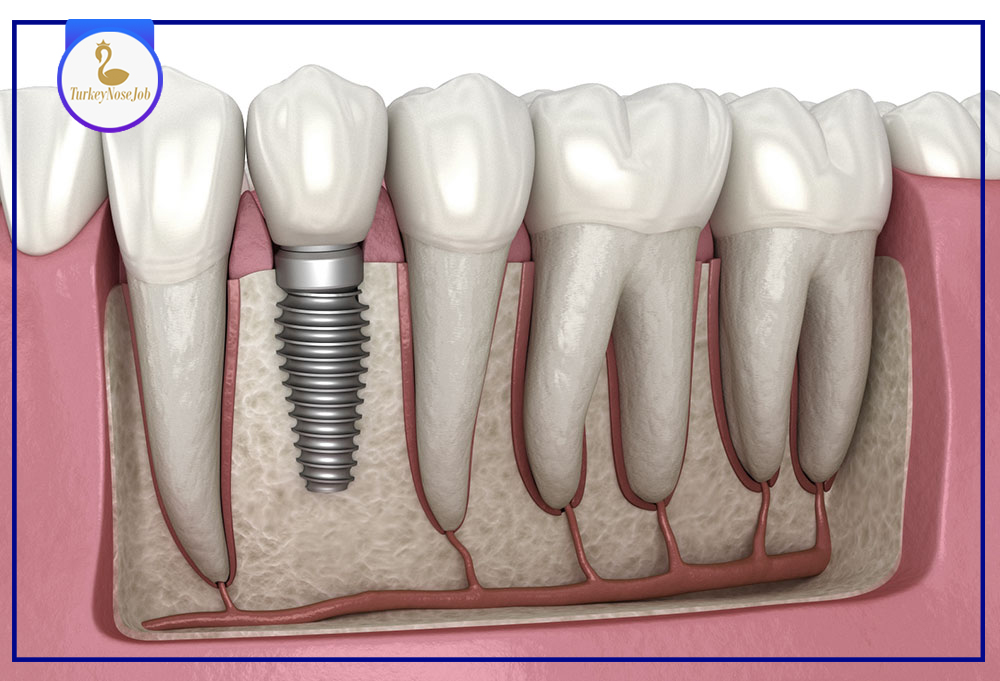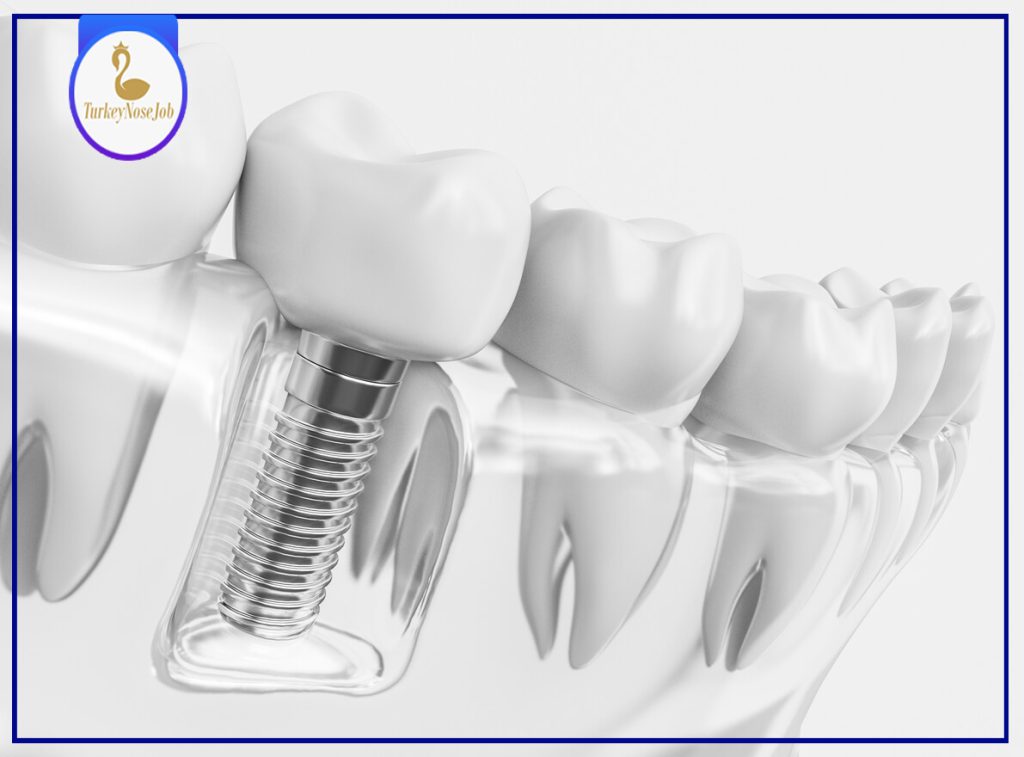Description
What is an implant?
Dental implants are the miracles of dentistry where your not-so-attractive smile can be replaced with a line of pearly white teeth and your lost tooth can be replaced for proper functionality that aids chewing and digestion. They greatly contribute to your beauty and health.
About 70% of adults between 35 and 44 in the US alone have lost at least one tooth due to trauma, dental decay, or gum disease, which can be replaced with an implant with a 95% success rate.
Dental implants are made from 2 parts, one of which acts like the root and the other is the crown. The former is a screw-like structure often made from titanium that will integrate with your jaw bone. If you have experienced bone loss, a bone graft will be necessary to strengthen the foundation for the implant. During the next 3-6 months, your bone will regrow to hold the implant in place. After complete healing, the crown will be placed, which is often made from ceramic.

How to prevent implant infection?
Dental implant infection is relatively rare but it starts with the buildup of bacteria that is neglected. It gradually develops to peri-implant mucositis which involves soft tissue (mucosa) inflammation. If it is not treated promptly, it will turn to peri-implantitis, which is a gum disease involving both soft and hard tissue, leading to bone loss and implant failure. If still neglected, it will lead to a systematic illness that is harder to treat and damages other organs.
What causes an implant infection?
Just like your natural teeth, dental implants can get infected because bacteria can grow and create a plaque that affects your gum and the underlying bones. Often a plaque biofilm is formed between the titanium implant and prosthetic crown that gradually extends to the gum.
Dental implant infection might occur due to many factors including the following:
- Poor dental hygiene: Lack of proper oral hygiene is the most contributing factor that allows the bacteria to stay and build up.
- Smoking: Smoking reduces blood flow to the gum due to blood vessel restrictions, which hinder nutrient delivery and removal of waste products. It also introduces bacteria to the mouth, which increases risk of buildup and infection.
- Weakened immune system: A compromised immune system for any reason can greatly impact the body’s ability to fight bacteria, which can eventually lead to infection.
- Jaw and gum conditions: Osteoporosis and gum disease (periodontitis) can also cause dental implant infection as they create gradual bone loss.
- Diabetes: Some diseases such as diabetes can also lead to infection as they cause systematic disruption in metabolism and the immune system.
- Allergy: Allergic reaction to implant itself might be a contributing factor.
- Certain medicines: Medications such as biphosphate for cancer are also considered a cause.
- Malocclusion or parafunctional habits: Misaligned bite (crossbite, overbite, underbite, open bite) and teeth grinding (bruxism) can eventually cause bacteria buildup and tooth implant infection.
- Improper implant placement: Surgical technique is very important in a dental implant procedure to make sure proper sterilization is observed and there is no gap left between the implant and jaw bone for the bacteria to grow. A highly qualified dentist with extensive experience in dental implants will take any measure necessary to prevent any chance of infection.

What are the symptoms of a dental implant infection?
Dental implant infection is just like natural tooth infection that causes the following symptoms:- Gum inflammation including redness and swelling
- Taste disturbance
- Bad breath
- Pain or discomfort
- Pus leak from the area
- Bleeding from surrounding tissue
- Fever
- Loose implant
- Difficulty chewing
HOW TO PREVENT DENTAL IMPLANT INFECTION?
- Follow the post-operative instructions given by your dentist. They are designed according to your individual needs so you must stick to them rigorously.
- Keep up with a routine dental hygiene that includes flossing and brushing your teeth twice a day. Be gentle though.
- Stay hydrated as water can flush bacteria buildup.
- Avoid excessive sugar consumption including drinks and fruit juices.
- Reduce your physical activity during the healing process.
- Avoid chewy foods and stick to a soft diet for 2 weeks after implant surgery such as soups, smoothies, yogurt, cottage cheese, oatmeal, mashed potatoes, scrambled eggs, bananas, and applesauce.
- Avoid smoking as it reduces your dental implant chance of success by 10%.
- Have your implants checked and cleaned by your dentist twice a year.
HOW TO TREAT DENTAL IMPLANT INFECTION?
The treatment aims to stop the progression of infection and to maintain the implant. It starts with an accurate diagnosis based on X-ray imaging to determine any possible bone loss. Then periodontal probing will determine the stage of infection and a treatment plan will be recommended which include a combination of the following methods:
-
Antibiotics
They are the first line of defense against any infection that might include pills or prescription-strength mouth rinse. Sometimes antimicrobial therapies are prescribed for infections caused by other microbes.
-
Mechanical debridement
This method is appropriate for shallow mucosal pockets where a carbon fiber curette or an ultrasonic device is used. Also known as submucosal debridement, the high-frequency waves clean the infected area around the implant.
In the case of deep mucosal pockets which are more than 5mm, mechanical flossing or delicate scaling instruments are used to clean the contamination without damage to the surface of the rod. Localized antiseptics are often used after mechanical removal of the infection.
-
Surgery
A surgical method or open flap debridement is utilized when access to infection site is not possible so a flap of gum is opened. According to the need, mechanical debridement and antiseptics are also combined.
-
Laser surface decontamination
This is a recent approach where laser beams are used to remove contamination from the surface of the titanium implant and surrounding tissues. The pulse settings are adjusted according to the level of peri-implantitis.
-
Implant removal
This is the worst-case scenario when the level of infection is severe and bone loss is significant which often happens when peri-implant mucositis develops into deep peri-implantitis. Surgical instruments such as a trephine or a forceps are often used for this procedure.
After several months of healing and bone grafts, reimplantation might be an option.
Dental Implants FAQs

-
Who is suitable for a dental implant?
We will be able to determine for certain if you are suitable for dental implants but generally if you have good health you will be suitable. We will assess the general condition of your mouth and look at the quantity and quality of bone to see if dental implants are an appropriate treatment. We very often take radiographs (xrays) of the area which give an indication of the amount of bone available for implant placement.
How is a dental implant placed?
Dental implants are usually placed under local anaesthetic in a very gentle manner. Following this you should expect a degree of discomfort and swelling for several days, but you will be able to continue normally fairly soon afterwards. Full after care advice is given following this procedure and if you are in any doubt we provide a telephone number where we can be contacted to offer you reassurance and advice.
Does it hurt?
The procedure is relatively straight forward and can usually be done under local anaesthetic. You may experience discomfort and you are likely to be given painkillers after the surgery to help with any pain you may experience. However, in general, most patients report that the procedure really wasn”t painful at all — certainly much less than expected.
How long does the surgery take?
This depends on the complexity of the case but usually a single implant can be placed in approximately an hour. This will depend on the amount of additional work required in terms of any bone grafting or work required on your gum.
Why is there a 3-6 month waiting period before the implants can be built upon?
There is the need for the implants to attach to the bone by a process which was originally described as osseointegration. The length of time for this waiting period varies with the quality of bone that is present where the implants were placed.
How long do implants last?
As implants are similar to natural teeth, if they are looked after they should last for many years but there is no lifetime guarantee. There is a small chance that an implant fails to osseo-integrate, that is, it does not become attached to the bone. In the upper jaw the chances of this happening are approximately 1-2%. We would normally become aware of this during the healing phase after implant placement and should it happen, we would remove the implant and may need to place another, several weeks later. Once integrated and functioning, you have in excess of a 90% chance of any implant still performing fine after 25 years. Therefore implants are a long term and predictable treatment option.
What happens if I do not have sufficient bone?
The key to successful implants is the quality and quantity of bone and we sometimes have to provide a replacement for a deficiency of bone and this usually takes the form of a small augmentation around the neck of the implant. Depending on the size of this deficiency, we can usually carry this out at the same time as implant placement.
How much does it cost?
You will find a variety of treatment options available on the internet for implants, but take care and examine each very carefully – the old adage ‘if it sounds too cheap it probably is’ comes into play here. There are just so many aspects of this complex form of implant dentistry to consider, from the training of the surgeons and restorative team, to the quality of the lab work and technicians involved and the time allowed to complete the treatment. Most importantly there are few implant systems that have the detailed and extensive research showing that they will last the test of time and chewing. It is always possible to use copy implants and cheaper components, but this is something we will never allow at City Bridge.
Our treatment ensures you will be cared for long-term, with ongoing follow-up appointments at the centre, ensuring a happy life away from the nightmares of dentures and painful failing teeth. A single implant with a crown restoration will cost approximate £2800.
How do you know how many implants you need?
Each case varies regarding how many implants are needed for the demands of replacing the missing teeth. If the implant surgeon is limited regarding the length of implants that can be placed, more implants will be needed. The length of the implants is determined by how much bone you have present. The number of implants is also dependant on the final restoration that is required and the number of teeth that are to be replaced.






Reviews
There are no reviews yet.